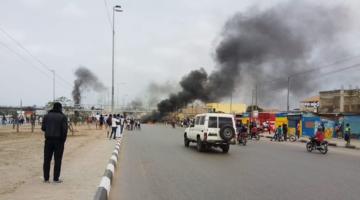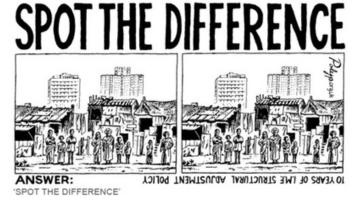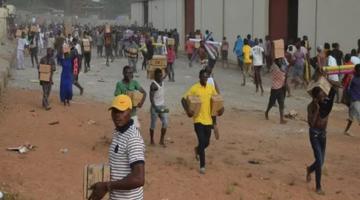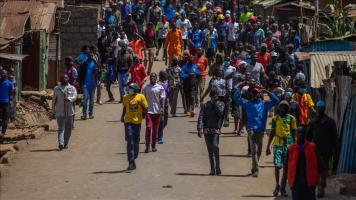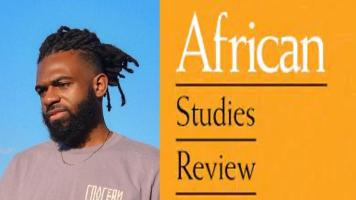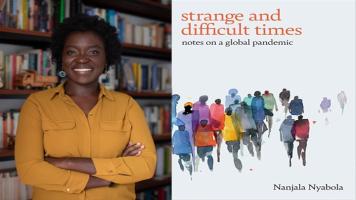The International Monetary Fund has a long history of insisting on loan conditionalities which are harmful to public services. This practice did not change even during the pandemic, with African countries being some of the worst affected.
This article was originally published in Peoples Dispatch.
Many have argued that decades of harsh International Monetary Fund (IMF) structural adjustment programs is one of the major causes of weak health systems in Africa. This was cited to be the fundamental cause for failures in disease surveillance and control that led to the Ebola outbreak in West Africa in 2014-16. What’s worse is that even the COVID-19 pandemic did not lead to a change of policy inside this institution.
When COVID-19 struck at the beginning of 2020, most of the African countries were tied up in IMF loan repayments. As of January 2020, 26 out of 54 African countries were undergoing IMF loan programs that demanded austerity, leaving countries with no untied money to spend freely for emergency preparation, one of the key prerequisites for a robust COVID-19 response.
By October 2020, the IMF had given out COVID-19 loans to 81 countries, 41 of which were in Africa. At that time, many pointed out that the loans were not enough to compensate for the immediate costs of handling COVID-19, let alone for making up for the losses in the long-term. The emergency loans did little to nothing when it came to secure payment suspension for existing debts, including those from the IMF. Reports pointed out that some of the emergency funding was actually used to pay off debts instead of being used for COVID-19 response.
While the IMF is not the only creditor for African countries, it sits at the top of the pyramid of international financial institutions. Failing to meet the IMF repayment schedule would result in further direct and indirect repercussions from other creditors. At the same time, IMF loans are structured in a way that undermines the government’s ability to provide public services. The conditions and debt repayment schedule are often extremely strict. Thus, funds which are needed for, for example, health and education, are heavily cut and large portions of the collected tax are earmarked for debt payment.
According to the IMF, of the 41 African countries that requested COVID-19 loans, 17 are already either in debt distress or run a high risk of it. Other countries fall in the category of “sustainable” risk assessment, and so according to the IMF, they should have no problem paying off the loan. However, Eurodad data indicates that even these countries would have a difficult time meeting loan obligations if they didn’t make significant changes to their accounts. The unsustainability is also implied by the IMF’s demand for across-the-board fiscal consolidation/austerity measures to be implemented at the earliest possible date. A United Nations report from 2020 said that developing countries of all income categories were already heading towards a debt crisis prior to COVID-19.
Toxic conditionalities
As a rule, IMF loans come with conditionalities, meaning that governments are required to adopt certain policies if they want to receive money. Typically, the policy package involves policies of austerity, i.e. mix of cuts in governments budgets and subsidies, privatization, i.e. selling off state assets or involving private sector fully or partially in developing infrastructures, liberalization, i.e. opening the country up to foreign investors in trade and financial sectors, deregulation, i.e. abolishing or diminishing laws that protect civil and workers’ rights to create a more enticing business environment for international investors, and sometimes currency devaluation, i.e. lowering currency value to facilitate exports.
This set of policies in practice leads to reduced numbers of health personnel, reduced or frozen salaries of health workers, and higher health services fees. All these changes weaken the reach of the health system, particularly in areas which investors deem non-lucrative and wasteful, such as community primary care and rural health programs. This adversely impacts monitoring and controlling disease outbreaks.
While the IMF boasted that the majority of their COVID-19 loans contain no conditionality, an Oxfam study found that a majority of them actually suggested or demanded cuts in government spending and salaries to serve debt repayment. In Africa alone, 19 countries, including Seychelles, Cabo Verde, and South Africa (Africa’s mature or better-off economies according to the World Bank), are to start austerity measures “once the pandemic subsides” or by 2023. An additional 14 countries, including Sierra Leone, South Sudan, and Guinea Bissau, were to start austerity measures as early as 2021. Incidentally, these 14 countries are considered to be among those with the weakest public health systems in Africa, and some are rife with internal conflicts.
When the loans were signed, it was obvious that these countries would not recover from the pandemic and economic crises soon enough to guarantee loan repayments. So it should not come as a surprise that by early 2022, 13 African countries were enrolled in another round of IMF programs, this time through the traditional loan mechanisms with stringent conditionalities.
Other African countries have applied for an extension and augmentation of their pre-COVID-19 IMF loans. Others are in negotiations with the IMF for new loans. It is worth noting that in most developing countries, signing a loan with the IMF is a precondition to start processes to restructure a nation’s sovereign debt. To put it simply, when countries want to negotiate with creditors other than the IMF, mostly from developed countries, the creditors demand that countries sign off loans with the IMF first. And so the vicious cycle continues. Paying off debt by taking on more debts, with long-lasting austerity for the years to come.
Bleak future for health?
Many countries, especially in Africa, are still struggling to control the pandemic and other resurgent diseases due to unequal access to vaccines and medicines. The depth of economic consequences is still difficult to predict. Coupled with austerity and privatization, this could bring further weakening of health systems in the foreseeable future.
IMF programs have been known to trigger conflicts or social unrest as governments enact cuts in jobs and basic subsidies, most often food and fuel. The phenomenon is so well known that there is a term coined for it – IMF riot! News from different regions, including West Asia and Latin America, indicate that the world is facing a widespread debt crisis. The protests often turn violent which are then dealt with harshly by the authorities, like the ongoing protests in Sudan. We are already witnessing a new wave of IMF riots, including the one in Guinea where security forces killed a protester during demonstrations against skyrocketing expenses including a 20% hike in the price of gasoline.
Verisk Maplecroft, a data analysis consultancy firm, recently reported on the 10 countries in extreme risk of social unrest. Among them are Kenya and Senegal, which have already enrolled in another round of IMF programs after receiving a COVID-19 loan. Tunisia’s negotiations have been marked by the IMF’s pressure to implement deep cuts even before the deals are signed. In the case of Egypt as well, the IMF is demanding application of austerity measures before authorizing an agreement. While the situation truly seems desperate, there is still room for governments to take corrective action both globally and nationally. People can still push governments in the direction of canceling unsustainable debts and putting investments back into public institutions which are accountable to the citizens. There should be a demand to create real progressive taxation and social measures. These are only a few on the list of possible solutions.
Dian Maria Blandina is a medical doctor from Indonesia, currently pursuing a PhD at Aristotle University of Thessaloniki, investigating the links between IMF policies and health. She is a dedicated activist in PHM.

